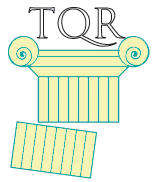Interview
Martin: Hi there, and thank you, I'm happy that you understood (Harry Kvist) and the book and I was excited when I read your review. You picked up some details that everyone has missed so far. Or at least,nobody spoke to me about them. Like the churches and the bells, this detail will be obvious in book three - SLUGGER - but I really did not expect anyone to see it this early on.
And yup, he's not that easy to like in CLINCH. I want the readers to be a bit confused in this first book, reflecting both Harry and my style of writing, mixing things up, and I know how to create a bit of confusion, at least in Sweden. I imagine this to be a sort of a queer project, queer being contradictory and somewhat paradoxical. I have no idea of how it translates though.
TQR: The question of translation is a good place to start. CLINCH's translation from Swedish to English was/is very well done. The little details of Kvist's paradoxical character, the church bells ushering in scenes and ringing them out; the accretion of detail that brings Kvist and 1930s Stockholm to life have all come across the language barrier quite well. But there is always something lost in translation, is there not? I can only guess there are puns and idioms and alliterative phrases that didn't make the leap from CLINCH's original version to its English derivation.
MARTIN:Yes I think the translation is a good one even though it's hard for me to judge nuances and tone, English not being my first language. Of course I collect old Swedish words, metaphors, songs, expressions, slang, sayings, stuff from the old Bible and so on and put them where I can, depending on the characters' sex, age and social group. Some things had to be re-invented, like the system for how people were addressing each other, especially when it came to how people from different classes talked to one another. Otherwise it would impossible for a modern reader in Sweden to understand. I also invent a lot of sayings, using alliteration and so on. I don't think it was an easy book to translate, but from what I can tell the translator did a really good job.
TQR: Like the nickname Kvisten? It appeared to have different connotations depending on who was using it to address him. He didn’t like it at all when the kid called him that! Kid should have known better.
MARTIN: Yes. Now fighters have cooler sounding nicknames, like Alexander "The mauler" Gustafsson. Back then they had silly sounding ones and Kvisten was his nickname during his boxing career, cause he was quite tall for a middle weight fighter. Harry "Kvisten" Kvist would sound even more silly in translation, something like Harry "Twiggy" Twig. It's ok when his few friends calls him Kvisten, but if it's somebody who doesn't know him, especially a kid or a woman, use it, it's quite disrespectful, and, I think, a reminder of the scandal that took everything away from him. When you watch a movie from the 30s, or hear the news on the radio from that period, it all sounds a bit silly. I can use some of it but have to balance it with some quite brutal scenes. It's supposed to be an homage to, and a game with, the old noir genre, merged with a Swedish expression, and it can't be all silly. But it provides some comic relief and adds some black humor to this pretty dark fantasy of mine.
TQR: Kvist's signature fight, the one everybody remembers, was against The Mallet. That was a pretty cool nickname. Your point is well taken though ... Twiggy Twig vs. The Mallet just sounds silly. What really throws a wrench in the gears though is the contrast twixt Kvist's lethal fists and his homosexual leaning. I mean, this fag will fuck you and then knock you the fuck out! Which is definitely an atypical alpha male characterization. I realize Kvist's sexual weakness for strapping young men was used as a way to firm up the frame job against him the night of Zetterburg's murder, but were there other reasons why you chose to go so drastically against detective noir type?
MARTIN: At the same time you need to update it, do a more modern take on the genre, and if you make your character somewhat contradictory and paradoxical you make them come alive. I really don't remember how I got the idea to begin with but it really made sense. When I started researching I could hardly find any stories about homosexuality in the working class, except for some police reports but they didn't give much at hand. It did fit right in, I knew that here was a story to be told, and at the same time it gave me a lot of creative space. And I just love when stereotypes collide.
About that signature fight, well I don't know. In this first book he says that he finished the fight and knocked his opponent out in the final round despite two broken ribs. In book number two it's three or four ribs and in book number three it's suddenly five. The guy is clearly unreliable: he is changing his stories a lot, can't remember anything, have an image of himself that has nothing to do with reality sometimes. Further on he's sometimes lying about his past to others and then it's his temper. When he's approaching someone on the street even I get a bit uncomfortable sometimes, is he going to ask the man for a match, or is he going to beat him senseless? No, I wouldn't trust him.
TQR: Kvist must fight his demons every day, and yet there are some really funny scenes and lines in CLINCH. The scene in the public restroom with Olga the transvestite when Kvist says or thinks ... I don't know who Virgil [the poet] might be, but I assume Olga prefers it in the Greek manner. !!! is fantastically funny. And how Lundin, seemingly Kvist's benefactor, is always totting up Kvist's bill should Kvist take a shot of his aquavit or cadge a spare piece of cheese! And the fact Kvist is constantly talking to himself whether alone or in public. These little funny details really make the scenes come alive.
MARTIN: Thank you. The truth is that I'm having so much fun with it, and often laugh out loud writing it, cause he's so punch drunk, and often drunk on top of it. He hates when he appears stupid and even though he's been forced to be individualistic and a loner, he still wants to fit in somehow. The thing about Virgil, who was Roman by the way, is one of my favorites, too.

